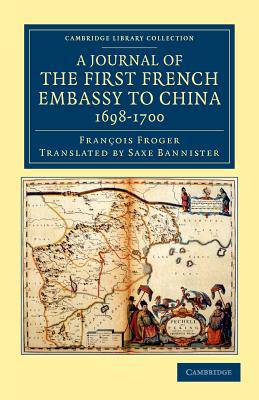
Door een staking bij bpost kan je online bestelling op dit moment iets langer onderweg zijn dan voorzien. Dringend iets nodig? Onze winkels ontvangen jou met open armen!
- Afhalen na 1 uur in een winkel met voorraad
- Gratis thuislevering in België vanaf € 30
- Ruim aanbod met 7 miljoen producten
Door een staking bij bpost kan je online bestelling op dit moment iets langer onderweg zijn dan voorzien. Dringend iets nodig? Onze winkels ontvangen jou met open armen!
- Afhalen na 1 uur in een winkel met voorraad
- Gratis thuislevering in België vanaf € 30
- Ruim aanbod met 7 miljoen producten
Zoeken
Omschrijving
It was not until the early twentieth century that the previously unpublished source of this 1859 work was identified as being itself a reworking of François Froger's Relation du premier voyage, fait en 1698, 1699 et 1700, a journal of his experiences as a young engineer while sailing with the first French ambassadorial party to China. This translation by Saxe Bannister (1790-1877) supplements the original official account with anecdotes and notes: the work is therefore based on composite primary evidence. This does not detract, however, from the worth of this book, in which Bannister uses a lengthy introduction and appendices of further primary evidence to apply what can be learned from earlier works to the contemporary context of the Opium Wars, aiming to promote a more peaceful and balanced attitude towards China. It is a useful example of scholarly propaganda in the history of nineteenth-century Anglo-Chinese relations.
Specificaties
Betrokkenen
- Auteur(s):
- Uitgeverij:
Inhoud
- Aantal bladzijden:
- 418
- Taal:
- Engels
- Reeks:
Eigenschappen
- Productcode (EAN):
- 9781108045537
- Verschijningsdatum:
- 2/08/2012
- Uitvoering:
- Paperback
- Formaat:
- Trade paperback (VS)
- Afmetingen:
- 140 mm x 216 mm
- Gewicht:
- 526 g

Alleen bij Standaard Boekhandel
+ 157 punten op je klantenkaart van Standaard Boekhandel
Beoordelingen
We publiceren alleen reviews die voldoen aan de voorwaarden voor reviews. Bekijk onze voorwaarden voor reviews.











